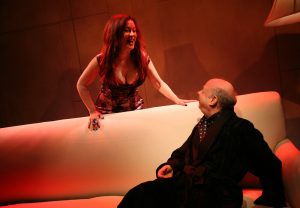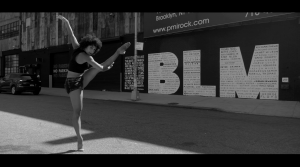
The never ending pandemic aroused many emotions in each of us. Those feelings also manifested themselves in bizarre, often erratic and mind-numbingly imbecilic behaviors. A prime example is that lunatic screaming hysterically in a supermarket while throwing groceries out of her cart. She did give us a laugh. She also made us cringe. Peter Gray’s new comedy The Karens will bring those hopefully suppressed memories back.
For those who missed 2020, a Karen is a noun in addition to a name. The term is pejorative “for a woman seeming to be entitled or uncompromising beyond the scope of what is normal.” At the play’s beginning a helpful clue reminds us that she is “frequently sporting a ‘speak to the manager’ haircut.” The comedic possibilities are endless.
Mr. Gray introduces three Karens in his story. They are indeed suffering and insufferable. But they are not the middle aged white privilege variety we’ve come to gawk at like feces eating primates at the zoo. These Karens are younger and each bears the burden of carrying the dreaded moniker. Imagine the horror of having that name and its heavy burden today.
These three high school chums get together on zoom to catch up during the summer of 2020. They proudly boast “we’re the Karens.” They lament the good old days when being a Karen meant style, sophistication and a certain joie de vivre. Then comes the punch line. Being a perfect Karen also meant not admitting to not knowing what “joie de vivre” means. Listen hard as there are dozens and dozens of zingers to be found.
X, Y and Z are the distinguishing markers for this trio. Karen X is black and describes herself as a “critically acknowledged life coach” and aspiring social media influencer. The Latina Karen Y is the CEO of “Party Girl Karen LLC.” Karen Z, the white one, now wants to be called Karen Zed. She is a yoga instructor. Each is branding and rebranding themselves. If there were hash tags when they were in high school, “it would have given my life purpose.”
The structure of Mr. Gray’s comedy swings from zoom meetings to social media posts particularly from Karen’s X and Z. Using their charisma, uniqueness, nerve and talents (and a pussy hat from the women’s march), they unite to “dismantle white supremacy.” Why? “So all the little girls who don’t know they could be like us could be like us.”
That these three are racially diverse adds to the fun but also gives them pause. Maybe they should add a Middle Eastern Karen to their group so they can “eat falafel without guilt.” The juiciest part of this satire is using the concept of the older Karens to put a harsh spotlight on the next generation of Karens in full obnoxious development. How many hash tags do you need to be perfectly woke?
Many life lessons are shared. Karen Zed gives tips on one of her videos. First on the list is fighting the urge to speak to a manager. Her advice is to go lower on the totem pole and make that person’s day. In her second tip, she tells us to avoid using the term totem pole. Racial adjacencies are frowned upon. When The Karens is at its best, the dialogue is an eye-rolling, smart-alecky treat.
When things get serious in the last third, however, the fun diminishes somewhat. The game night plot diversion forces Karen Y to abruptly change her personality which does not really gel. An intervention does help these “washed up shallow influencers.” One of them realizes “if I just opened up a little I could be the face of the well-intentioned incompetent.”
As the three Karens, Morgan Danielle Day (X), Felicia Santiago (Y) and LaurenSage Browning (Z) all have great moments to shine. Director and Editor Michael Alvarez appropriately lays the satire on thickly. The videos are a hoot, especially Karen X’s nature walk and Whole Foods parking lot excursions. When she reveals that she “wants to be that bad ass bitch on her Instagram bio,” the new generation of insufferable Karens are laid bare for all to see.
Karen Zed might win the award for most laughs as she is written and played with dim-witted brilliance. Peter Gray’s The Karens is entertaining even if it, like an aggrieved Karen in aisle 12, hangs around too long with diminishing pleasures. I suggest grabbing an “anti-racist cocktail” and savoring the abundant witticisms. Copenhagen, after all, is a “backwater place with universal health care.”
The Karens is presented by The Muse Collective. The show is virtually streaming August 13 – 27, 2021.
www.the-muse-collective.com











You must be logged in to post a comment.